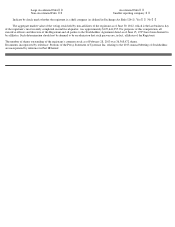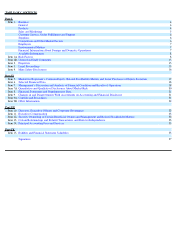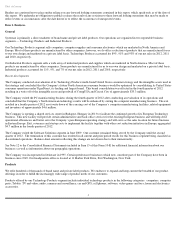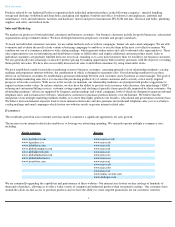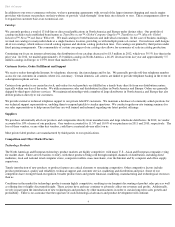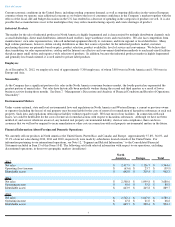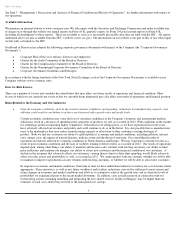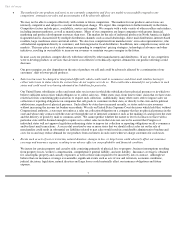CompUSA 2012 Annual Report Download - page 13
Download and view the complete annual report
Please find page 13 of the 2012 CompUSA annual report below. You can navigate through the pages in the report by either clicking on the pages listed below, or by using the keyword search tool below to find specific information within the annual report.
The acquisition of certain assets of CompUSA, Circuit City and the purchase of the stock of WStore Europe SA resulted in the
recording of significant intangible assets and/or goodwill. We are required to test goodwill and intangible assets annually to
determine if the carrying values of these assets are impaired or on a more frequent basis if indicators of impairment exist. If any of
our goodwill or intangible assets are determined to be impaired we may be required to record a significant charge to earnings in the
period during which the impairment is discovered. In the fourth quarter of 2012, the Company did record one-time, non-cash
impairment charges of approximately $35.3 million related to the intangible assets and goodwill of CompUSA and Circuit City.
We operate internationally and as a result, we are subject to risks associated with doing business globally, such as risks related to
the differing legal, political and regulatory requirements and economic conditions of many jurisdictions. Risks inherent to
operating internationally include:
• Changes in a country’s economic or political conditions
• Changes in foreign currency exchange rates
• Difficulties with staffing and managing international operations
• Unexpected changes in regulatory requirements
• Changes in transportation and shipping costs
• Enforcement of intellectual property rights
We conduct our business and incur costs in the local currency of most of the countries in which we operate. The financial
condition and results of operations of each foreign operating subsidiary are reported in the relevant local currency and then
translated to U.S. Dollars at the applicable currency exchange rate for inclusion in our consolidated financial statements. Changes
in exchange rates between these foreign currencies and the U.S. Dollar will affect the recorded levels of our assets, liabilities, net
sales, cost of goods sold and operating margins and could result in exchange gains or losses. The primary currencies to which we
have exposure are the European Union Euro, Canadian Dollar, British Pound Sterling, and the U.S. Dollar. Exchange rates between
these currencies and the U.S. Dollar in recent years have fluctuated significantly and may do so in the future. Our operating results
and net income may be affected by any volatility in currency exchange rates and our ability to manage effectively our currency
transaction and translation risks. For example, we currently have operations located in numerous countries outside the United
States, and non-U.S. sales (Europe and Canada) accounted for approximately 37.8% of our revenue during 2012. To the extent the
U.S. dollar strengthens against foreign currencies, our foreign revenues and profits will be reduced when translated into U.S.
dollars.
Our inventory is subject to risk due to technological change and changes in market demand for particular products. If we fail to
manage our inventory of older products we may have excess or obsolete inventory. We may have limited rights to return purchases
to certain suppliers and we may not be able to obtain price protection on these items. The elimination of purchase return privileges
and lack of availability of price protection could lower our gross margin or result in inventory write-downs.
We also take advantage of attractive product pricing by making opportunistic bulk inventory purchases; any resulting excess and/or
obsolete inventory that we are not able to re-sell could have an adverse impact on our results of operations. Any inability to make
such bulk inventory purchases may significantly impact our sales and profitability.
Table of Contents
•
Goodwill and intangible assets may become impaired resulting in a charge to earnings.
• Our substantial international operations are subject to risks such as fluctuations in currency rates (which can adversely impact
foreign revenues and profits when translated to US Dollars), foreign regulatory requirements, political uncertainty and the
management of our growing international operations
.
• We are exposed to various inventory risks, such as being unable to profitably resell excess or obsolete inventory and/or the loss of
product return rights and price protection from our vendors; such events could lower our gross margins or result in inventory
write
-
downs that would reduce reported future earnings.
11


